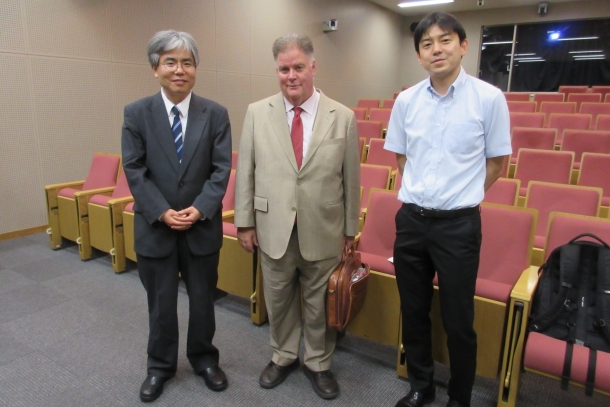On May 19th, 2018, Waseda University’s Global Asia Research Center and Institute for Advanced Social Sciences co-hosted a special seminar, titled “Why did political meritocracy fail in Western societies?” by Professor James Hankins, Professor of History at Harvard University. He is also the founder and general editor of the I Tatti Renaissance Library (Harvard University Press).
In this seminar, Professor Hankins presented his preliminary explorations on the topic of political meritocracy in a comparative historical perspective between the East and West. In the East, there is a long tradition Confucian meritocracy, with China representing the first and most successful case. In contrast, the West in the modern period has focused on constitutional democracy and there is a long tradition of political meritocracy dating back to ancient Greek and Rome, which particularly flourished during the Italian Renaissance.
Professor Hankins assessed that the main political crisis of our times is a crisis of the governing elites and their relationship to the people. Modern Western and Westernized societies tend to focus solely on technical meritocracy – creating and justifying the rule of experts, while the effort to reform the ruling elites has largely been demoralized. As a result, expertise has been increasingly discredited in America. It would be better to reexamine the problem with the elites as a problem of moral and intellectual formation, which could be addressed using humanist political thought from the Renaissance.
The central concern of humanist political theory is how to nurture wise and virtuous rulers while protecting them from corruption by power. The humanists of the Renaissance, including teachers, diplomats, administrators, etc. cared more about the rulers than the legitimacy of regimes. They strived to reform regimes through education and public eloquence, opening up the ranks of the political elite to those with ruling virtue. In this sense, humanists during the Renaissance could be considered as rather radical thinkers in their time.
Still, the humanist ideals of the scholar-official or humanist advisor to rulers did not outlive the Renaissance. This owned much to the fact that no European power ever succeeded in establishing complete hegemony over the rest. Incessant warfare between European states allowed technical experts to accumulate power. Their expertise in science, geography and engineering could be readily converted for military usage. The humanists, whose sphere of influence was quickly reduced to education, were never able to compete successfully for political influence. Furthermore, Professor Hankins pointed out that the reliance on the law by Western states, not the prudence of magistrates, was another principal reason the idea of the scholar-official declined after the Renaissance.
It is undeniable that the rule of law has great value in creating legitimacy in a state’s political order as well as stable conditions for economic life. Yet it also tries to solve moral problems with the multiplication of laws, increasing surveillance, and establishing regimes of compliance and coercion. Bureaucracies like this gravely inhibit the ability of those in authority to exercise prudence and equity in the spirit of moderation and humanity. Professor Hankins assessed that it is important for political thinkers to reduce the reliance on law by drawing on the lessons of older humanistic traditions in the West.
After the seminar, the audience engaged in a lively discussion with Professor Hankins. The conversation ranged from the importance of classical literature education in the humanistic tradition to the comparison between Western societies and Japanese society. Participants were impressed by Professor Hankins’s thought-provoking presentation and his insightful response to every question.









